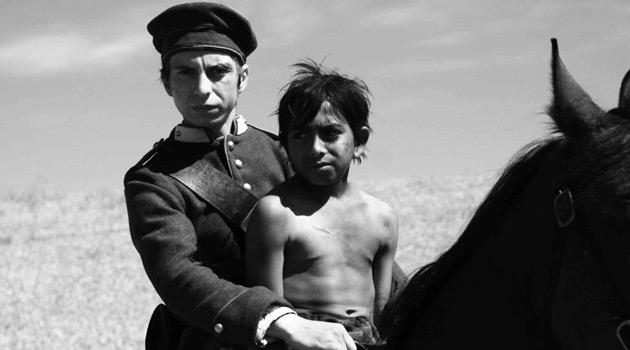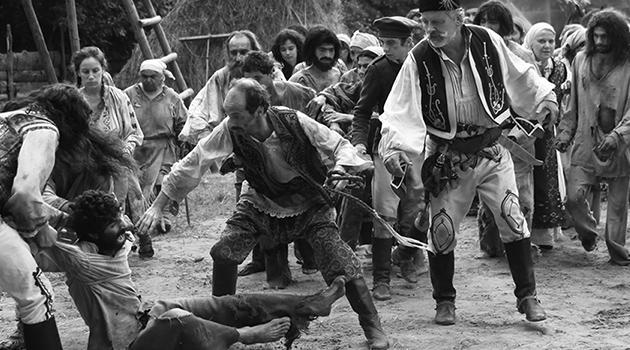Romanian film "Aferim!", set during era of Roma slavery, discusses various forms of honor

A gendarme and his sidekick, a father and son looking for a runaway Gypsy slave, ride through the breathtaking landscape of Wallachia. On the way they encounter various characters who almost always represent some sort of social type, whether it’s a psychopathic Orthodox priest, a band of local mercenaries, Gypsy serfs and their only slightly more well-off masters from the impoverished peasant class, or drunkards and whores at a traveller’s tavern.
As we know, Romani enslavement was the final European institution of its kind; it was not abolished until 1856, at a noticeable distance in time from the
Enlightenment. The Gypsy slaves who are simply labeled in this film as "crows" have no inkling that they are living at a time of the ongoing cultural and spiritual aggrandizement and
transformation of European society.
The slaves are shown moving through a dusty, feudal, inhospitable landscape in either resigned indifference or making painstakingly ridiculous displays of wasted effort
depending on whether a member of the aristocracy is around. "Aferim!", however, is not first and foremost a film about either Romani people or (Romani) slavery.
This unusual "eastern" is especially famous for its sociological depiction of an environment and time that transformed only superficially in many respects
over several decades. Its pure comedy is captured in the very name of the film, with the snappy term "Aferim!" (or "Bravo!") in tune with the semantically "black and
white" events on the screen (echoed by the choice to film in black and white), and it must be said that it is exceptionally appropriate for the genre.
There are moments when this "peculiar road movie" sometimes overshoots the mark (such as the scene with the misanthropic Orthodox priest) sending one "message" after another of precisely timed, inadvertently chilling observations about human nature. The character of the father, who lavishly dispenses aphorisms, sayings and witticisms not only to briefly lament the plight of the human race, but also to transmit some kind of lesson to his teenage son, gradually lose all their comedic value.
Through several exceptionally successful moments the personal history of the father is revealed to the viewer, beginning with military plunder and ending with
sexual aggression, revelations that also come because as the story gradually develops and the plot thickens, the father’s high-spirited, loud braggadocio
begins to give way to the naive, untainted gaze of his somewhat dumbfounded son. When the central characters manage to fulfill their initial mission of apprehending
and returning the runaway Gypsy, who is allegedly guilty of stealing from an aristocrat’s estate, the storyline accelerates sharply in terms of drama without abandoning its
comedic stance, which merely persists with an even more unbearably ironic grin.
The dialogue between the travelling jailers and their prisoners is, together with the situational dramaturgy, the unequivocal high point of the film. Director Radu
Jude’s feeling for the study of psychological micro-phenomena is enhanced by being contrasted to the opulence of his chosen genre and its imagery.
One line from the father’s strokes of wisdom, "We are living as we can, not as we want", in all of its banality and alibi-providing potential, becomes the motto for the attitude taken by all those in the film who find themselves in the thankless position of standing between a master and a servant. The servant is the
one who can do nothing but hungrily watch as his superiors feast and indulge themselves while grousing over their sordid reality, silently waiting to receive the
least-gnawed bones as his portion.
In this film a Romanian gentleman is an actual autocrat, an oligarch the hem of whose garment is kissed and whose hookah is prepared so he can then proceed to sentence someone
to death who has no name and no rights. The world order is deadlocked in a fixed position, a social stratification chosen by no one and yet followed by all,
immune to bits of complaints and the constant stream of lamentations.
"I was honorable my entire life and obeyed the law" the father says, summing up his life philosophy while in the background, the ax blades are sharpened
for the executioner’s chopping block. The main strength of this extraordinary film is how discreetly its eternal message encompasses both the future and the past.
VIDEO
